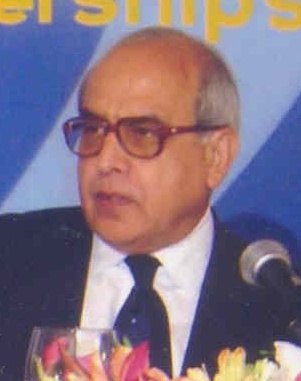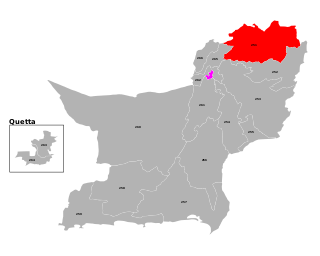
Farooq Ahmad Khan Leghari was a Pakistani politician who served as the eighth president of Pakistan from 14 November 1993 until resigning on 2 December 1997. He was the first Baloch to be elected as President.

Muhammad Rafiq Tarar was a Pakistani politician and jurist who served as the ninth president of Pakistan from January 1998 until his resignation in June 2001, and prior to that as a senator from Punjab in 1997. Before entering politics, Tarar served as senior justice of the Supreme Court of Pakistan from 1992 to 1994 and as the 28th Chief Justice of Lahore High Court from 1989 to 1991.

Syed Sajjad Ali Shah was a Pakistani judge who served as the 13th Chief Justice of Pakistan from 4 June 1994 to 2 December 1997. He had been appointed as Chief Justice of the Supreme Court by Benazir Bhutto. Prior to that, he served as the 6th Chief Justice of Sindh High Court from 13 December 1989 to 4 November 1990.

Since its establishment in 1947, Pakistan has had a non-symmetric federal government and is a federal parliamentary democratic republic. At the national level, the people of Pakistan elect a bicameral legislature, the Parliament of Pakistan. The parliament consists of a lower house called the National Assembly, which is elected directly via first-past-the-post voting, and an upper house called the Senate, whose members are chosen by elected provincial legislators. The head of government, the Prime Minister, is elected by the majority members of the National Assembly and the head of state, the President, is elected by the Electoral College, which consists of both houses of Parliament together with the four provincial assemblies. In addition to the national parliament and the provincial assemblies, Pakistan also has more than five thousand elected local governments.

Jamiat Ulema-e-Islam is a Deobandi Sunni Muslim organization that was founded on 26 October 1945 by Shabbir Ahmad Usmani as a pro-Pakistan offshoot of the Jamiat Ulema-e-Hind (JUH). It has run candidates for office in Pakistani provincial and national elections, and splintered into several groups in 1980, 2007, and 2020.

Fazal-ur-Rehman is a Pakistani politician who is the president of Jamiat Ulema-e-Islam (F). He is also the president of the Pakistan Democratic Movement (PDM), a coalition of political parties which ousted then prime minister Imran Khan through a no-confidence motion in 2022. He has been a member of the National Assembly since February 2024 and previously served in that position between 1988 and 2018. He was also the Leader of the Opposition from 2004 to 2007. He is a supporter of the Taliban government in Afghanistan and has demanded for its international recognition. In the 1980s, he was part of the Movement for the Restoration of Democracy (MRD), which was formed to end the military regime of General Zia-ul-Haq.

An indirect presidential election was held on 6 September 2008 in Pakistan. The Electoral College of Pakistan – a joint sitting of the Senate, National Assembly and Provincial Assemblies – elected a new president after the resignation of President Pervez Musharraf. As required by the constitution, Muhammad Mian Soomro automatically became acting president on 18 August 2008, upon the resignation of Musharraf. The constitution required that a new president be elected by Parliament within 30 days; Soomro was considered loyal to Musharraf, and it was considered certain that he would be replaced in that election.

General elections were held in Pakistan on 3 February 1997 to elect the members of National Assembly. The elections were a fierce contest between Pakistan Peoples Party (PPP) led by pre-election Prime Minister Benazir Bhutto and the Pakistan Muslim League (N) led by Nawaz Sharif. Unlike the 1990 elections where Sharif won due to allegations of rigging, this time he benefited from the controversial death of Bhutto's brother Murtaza, a populist leader, a worsening economy, and alleged corruption cases against Bhutto's husband Asif Ali Zardari.

Jamiat Ulema-e-Islam Pakistan also known the Jamiat Ulema-e-Islam or simply as Jamiat Ulema-e-Islam (F)(Urdu: جمیعت علماءِ اسلام (ف); lit. 'Assembly of Islamic Clerics (Fazal-ur-Rehman)'; abbr.JUI (F) is an Islamic fundamentalist political party in Pakistan. Established as the Jamiat Ulema-e-Islam in 1945, it is the result of a factional split in 1988, F standing for the name of its leader, Fazal-ur-Rehman.

NA-251 Sherani-cum-Zhob-cum-Killa Saifullah is a constituency for the National Assembly of Pakistan.
Jamiat Ulama-e-Islam Nazryati was a political party in Pakistan. It was formed by Maulana Asmatullah Khan after leaving Jamiat Ulema-e-Islam. It was formed as a breakaway faction of JUI(F) in 2007 and merged again with its parent organisation i.e. JUI-F in 2016. It participated in 2008 and 2013 Pakistani general election.
Maulana Muhammad Gohar Shah is a Pakistani politician who had been a member of the National Assembly of Pakistan, from June 2013 to May 2018. Previously he had been a member of the National Assembly from November 2002 to November 2007.
Muhammad Jaffar Khan Leghari was a Pakistani politician who was a member of the National Assembly of Pakistan, since August 2018 until his death in December 2022. Previously, he was a member of the National Assembly from October 2002 to 2007, from 2008 to 2013, and from June 2013 to May 2018.

Maulana Muhammad Khan Sherani is a Pakistani Deobandi religious cleric and politician who established Rabita Jamiat Ulema-e-Islam the breakway faction of Jamiat Ulema-e-Islam (F) over rifts with (JUI-F) leader Fazal-ur-Rehman. He had been a member of the National Assembly of Pakistan, between 1988 and May 2018. He was the Chairman of the influential Council of Islamic Ideology from 2010 to 2016.

Senate elections were held in Pakistan on 5 March 2015 to elect the replacements for 52 retiring senators. Those retiring include chairman Nayyar Hussain Bukhari and deputy chairman Sabir Ali Baloch of the upper house. Pakistan Peoples Party (PPP), the majority party in Senate, would lose 21 members, followed by Pakistan Muslim League Nawaz would lose 9 and Awami National Party would lose 6 members.
Asmatullah was a Pakistani politician who was a member of the National Assembly of Pakistan from 2008 to 2013 and from 2018 to 2023.
Sheikh Jaffar Khan Mandokhail is a Pakistani politician who is currently serving as the 24th Governor of Balochistan, in office since 6 May 2024.
Zafar Azam is a Pakistani politician who had been a member of the Provincial Assembly of Khyber Pakhtunkhwa from August 2018 to January 2023.

Rabita Jamiat Ulema-e-Islam (RJUI) is a Deobandi Islamist political party in Pakistan. It was established on 29 December 2020 as a breakway faction of Jamiat Ulema-e-Islam (F) (JUI-F), which was led by Fazl-ur-Rehman. The founder of the RJUI is Muhammad Khan Sherani and the Ameer of the party is Shuja ul Mulk. The party was registered with the Election Commission of Pakistan on 20 September 2022.
Khushal Khan Kakar is a Pakistani politician who is the founder of the Pashtunkhwa National Awami Party (PNAP).














